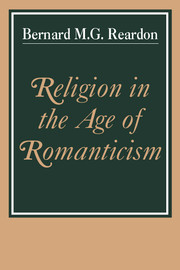Book contents
- Frontmatter
- Contents
- Preface
- 1 Romanticism, idealism and religious belief
- 2 Schleiermacher on the religious consciousness
- 3 Hegel and Christianity
- 4 The idea of God in the philosophy of Schelling
- 5 German Catholic theology in the Romantic era
- 6 Italian ontologism: Gioberti and Rosmini
- 7 Lamennais and Paroles d'un Croyant
- 8 Auguste Comte and the Religion of Humanity
- 9 Ernest Renan and the Religion of Science
- Notes
- Index
5 - German Catholic theology in the Romantic era
Published online by Cambridge University Press: 05 June 2012
- Frontmatter
- Contents
- Preface
- 1 Romanticism, idealism and religious belief
- 2 Schleiermacher on the religious consciousness
- 3 Hegel and Christianity
- 4 The idea of God in the philosophy of Schelling
- 5 German Catholic theology in the Romantic era
- 6 Italian ontologism: Gioberti and Rosmini
- 7 Lamennais and Paroles d'un Croyant
- 8 Auguste Comte and the Religion of Humanity
- 9 Ernest Renan and the Religion of Science
- Notes
- Index
Summary
In germany the response of Catholic thinkers to the challenge of Enlightenment rationalism assumed a markedly different form from what it did in France. In the latter country its effect had been to produce a wave of anti-rationalism, culminating in the traditionalism of Joseph de Maistre, Louis de Bonald and Félicité de Lamennais, according to which all knowledge of truth in the religious and moral order rests on an original divine revelation transmitted from age to age in an unbroken tradition. Under this doctrine human reason has no intrinsic power of reaching such truth, which can be received only by an act of faith in the nature of an intellectual assent. In Germany, on the other hand, rationalism was answered by rationalism, if of a modified kind, a ‘semi-rationalism’. The veracity of the Christian religion, that is, was to be demonstrated by appeal to its rational foundations. It could then be shown that theology, as itself a science, had no interest in resisting progress in any area of knowledge and that Catholicism could retain its rightful place in modern culture unembarrassed by the charge that its teachings had no support beyond that of an authoritarian and reactionary institution. In the circumstances of the time it was a bold claim, but those who maintained it were unabashed when confronted either by the negations of sceptics or the misgivings of their ecclesiastical superiors.
- Type
- Chapter
- Information
- Religion in the Age of RomanticismStudies in Early Nineteenth-Century Thought, pp. 117 - 145Publisher: Cambridge University PressPrint publication year: 1985



